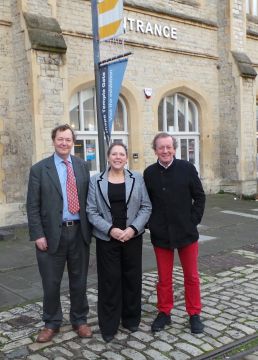Bristol is to become a test bed for hybrid buses that can automatically switch from diesel to electric power to reduce emissions in areas of the city with poor air quality.
The vehicles will be piloted on the city’s streets thanks to a £1m Government grant. The trial coincides with Bristol’s year as European Green Capital and strengthens Mayor George Ferguson’s ambition to make the city a laboratory for change in areas such as greentech.
The ‘geo-fence’ technology works by automatically switching diesel-electric hybrid vehicles to zero emissions via GPS when it enters a specific part the city.
The trigger zones will be set on the areas with poorer air quality and Bristol City Council will use the data collected to evaluate the benefits for the city environment along with the operational impacts for the bus service. The city has a relatively poor record on air quality with a number of areas above the European standard for pollution.
The funding was announced today by transport minister Baroness Kramer on a visit to Bristol. She said: “This ground-breaking trial will make a real difference in improving people’s lives in Bristol.
“The funding will provide greener buses to help tackle poor air quality across the city.”
The funding forms part of the Government’s £58m Green Bus Fund, which, said Baroness Kramer, was putting almost 900 new low-carbon buses onto England’s roads.”
Mayor Ferguson added: “This is perfect timing for Bristol to test such advanced technology as we start our year as the UK’s first European Green Capital which is very much about the health of the city. This ‘geo-fence’ technology will enable vehicles to recognise when they enter the areas of the city where we have the most significant air pollution problems and then switch to a green electric mode.
“We need to exploit these new technologies to help us reach a future where we can all enjoy cleaner air, and a healthier fu ture where streets are no longer clogged with traffic, where public transport provides an affordable, quality alternative to the car, and it is increasingly attractive to walk and cycle. Air quality improvements improve health and bring a higher standard of living which will contribute further to Bristol’s reputation as the most liveable city in the UK.”
ture where streets are no longer clogged with traffic, where public transport provides an affordable, quality alternative to the car, and it is increasingly attractive to walk and cycle. Air quality improvements improve health and bring a higher standard of living which will contribute further to Bristol’s reputation as the most liveable city in the UK.”
The £1mi grant from the green bus fund will be used to buy an unspecified number of hybrid buses with geo-fencing capability. The council will shortly launch a competition to select a bus operator in order start the trial before the end of the summer 2015. The exact area the buses will operate using the geo-fence technology is yet to be decided.
Parts of Bristol city centre and areas along its main arterial roads suffer poorer quality than the EU standards for nitrogen dioxide.
Bristol is also piloting driverless cars this year as part of the VENTURER project and is encouraging motorists to switch to electric cars by installing charging points across the city – by spring the city will have 100.
Transport minister Baroness Kramer with Andrew Garrard, left, chair of Bristol European Green Capital 2015, and Mayor of Bristol George Ferguson






























